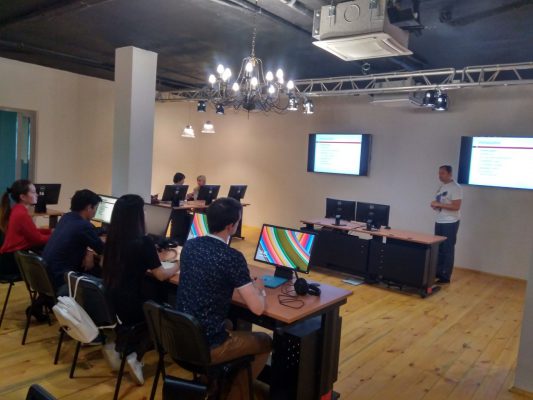Retranslation: a whim or a necessity?
 On May 4, Full Professor of the Department of Translation of the University of Ljubljana Vojko Gorjanč delivered a lecture for first and second-year MA students of the Caspian Higher School of Interpreting and Translation. The presentation was dedicated to an urgent issue of translating texts that had already been translated before. Mr. Gorjanč defined the term “retranslation” and explained why it is important to retranslate texts. He also spoke about the most common areas where texts were retranslated due to the changes dictated by the time.
On May 4, Full Professor of the Department of Translation of the University of Ljubljana Vojko Gorjanč delivered a lecture for first and second-year MA students of the Caspian Higher School of Interpreting and Translation. The presentation was dedicated to an urgent issue of translating texts that had already been translated before. Mr. Gorjanč defined the term “retranslation” and explained why it is important to retranslate texts. He also spoke about the most common areas where texts were retranslated due to the changes dictated by the time.
Classic and religious literature is the most frequent of object of retranslation. It may seem strange when a universally approved translation anchored in the minds of those who discovered a foreign artwork in this version is suddenly questioned and adjusted. No one doubts professional qualification of the first translator but language changes like everything else in the world. Sometimes an original text and its publisher policy can also be changed. Eventually, facts described in the text may be reinterpreted in the modern world.
Language and translation norms are variable. As they were formulated in a certain time, they need to be adapted and comply with sociocultural framework of society. That is why translators are crucial actors in changing artwork content as they transfer era’s ideas and beliefs in their translations.
Prof. Gorjanč asked trainers and students some questions about retranslating books, films, songs, etc. that he believes are most interesting. In the Soviet Union books and films containing inappropriate content were not publicly available.
Only after rigorous verification and dramatic content change by censors, the work could be allowed for distribution. Approximately at the same time when some topics were considered inappropriate in the Soviet countries they were already openly discussed in Slovenia. This process shows how language quickly evolved in this Western country. At this point retranslation was necessary for the modern language speaking society to understand works written back in the 18th-19th centuries.





